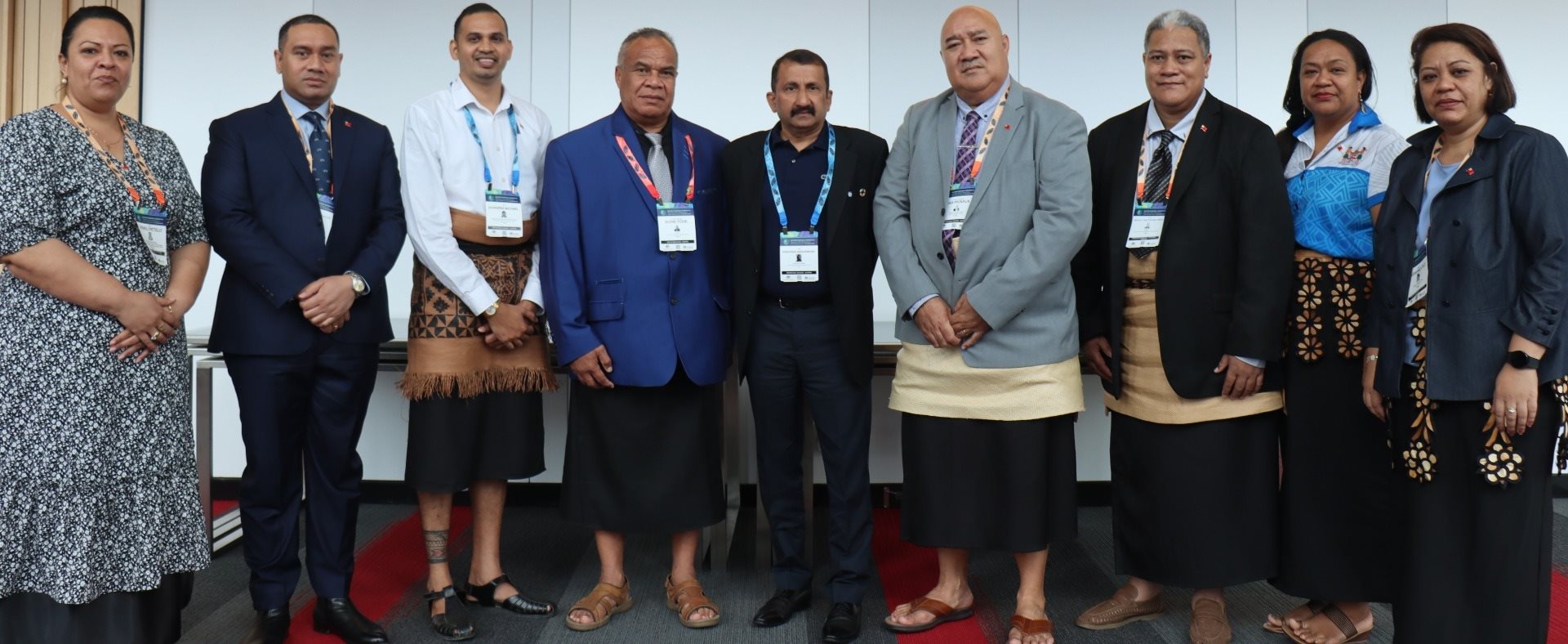Tonga Delegation Raises Climate Finance Concerns at Brisbane Conference
 (Meetings between the UN Pacific teams and Tongan delegation at the 2022 Asia Pacific Ministerial Conference on Disaster Risk Reduction in Brisbane, Australia)
(Meetings between the UN Pacific teams and Tongan delegation at the 2022 Asia Pacific Ministerial Conference on Disaster Risk Reduction in Brisbane, Australia)
The Asia-Pacific Ministerial Conference on Disaster Risk Reduction (APMCDRR) in Brisbane provided Pacific nations with an important international forum to share their experiences, coping methods and priorities during natural disasters.
Over 3000 delegates attended the conference, both physically and virtually, at Brisbane’s Convention and Exhibition Centre from September 19-22, jointly hosted by the Australian Department of Foreign Affairs and Trade and the UN Office for Disaster Risk Reduction.
Among the Pacific countries present was Tonga, a nation of 105,000 people that is one of the world’s most vulnerable to climate and disaster risks – such as tropical cyclones and seismic activity.
Located 1800 kilometres from North Island in New Zealand, the country was recently devastated by a tsunami that was triggered by a massive undersea volcanic eruption.
As one of the world’s most vulnerable nations to climate shocks, it was important for Tonga’s voice to be heard at a major regional forum such as APMCDRR.
The Tongan delegation at the conference was led by the Minister for Agriculture, Lord Sione Siale Fohe, and Minister for Health and Public Enterprises, Dr Saia Ma’u Piukala.
They joined ministerial delegations and disaster risk reduction experts from across the Asia-Pacific region .
The UN Capital Development Fund (UNCDF) was part of the conference to share lessons from the Pacific Insurance and Climate Adaptation Programme’s (PICAP) work on building the financial preparedness and resilience of low-income groups in the region through parametric insurance.
The Programme supported the participation of Kilisitina Tuaimeiapi, CEO of Tonga’s Ministry of Finance, and Kepueli Ngaluafe, Principal Accountant - Aid Management and Resilient Development Division, at the conference.
Ms Tuaimeiapi said they joined the Tongan delegation with one aim: to ensure Tonga’s experiences and concerns were at the forefront of regional and global conversations on disaster risk reduction and management.
“These events will help Tongan officials engage with people who can assist us cope and recover [from natural disasters]. There’s a lot at stake for our people,” she added.
In January, the world watched in shock at the eruption of the Hunga Tonga-Hunga Ha’apai undersea volcano and consequent tsunami that affected 85% of the population.
This 'once in a millennium’ disaster caused three deaths and over US$90 million in economic damage to private and public infrastructure, including the country’s only undersea cable.
The eruption came as the country was still recovering from Tropical Cyclone Harold, a Category 5 storm that struck the island in 2020. Tsunami response efforts were further complicated by an outbreak of COVID-19 in February.
While the Tongan diaspora was instrumental in supporting recovery efforts, Ms Tuaimeiapi said that lack of access to climate finance has been a major impediment to disaster risk management and reduction in the country.
Tonga launched its 2021-2025 Disaster Risk Finance Strategy last year to mainstream disaster-related financial risk planning in all government activities, with the aim of building long-term resilience against climate hazards.
For example, the strategy prioritises the maintenance of critical infrastructure to withstand the impacts of climate disaster and remain functional over the long-term.
However, according to Ms Tuaimeiapi, meeting the strategy’s targets has proved difficult due to lack of access to finance from global funding facilities, such as the Green Climate Fund.
With climate disasters expected to intensify in the coming years, she is worried that Tonga will not be adequately prepared when the time comes.
Ms Tuaimeiapi has called for the reduction of barriers to accessing climate finance for countries like Tonga, which are facing the brunt of climate change despite a miniscule contribution to the problem.
Parametric Micro-insurance
One potential solution being explored is climate and disaster risk parametric micro-insurance.
Following success in Fiji, UNCDF’s Pacific Insurance and Climate Adaptation Programme (PICAP) will launch a parametric micro-insurance scheme in Tonga this year.
The product will offer financial protection against climate hazards for small-holder farmers, fishers, MSMEs and low-income groups.
More than 1388 people have signed up for the scheme in Fiji, with plans to increase that number to 4000 before November 2022.
The Programme has similar ambitions in Tonga and will work closely with the Tonga Development Bank and other public and private sector partners to achieve these targets.
“Recognizing that Tonga is among the most vulnerable countries in the world and the recent extreme geo-hazard incidents, UNCDF is keen to offer its technical expertise and expand its regional roll-out of parametric microinsurance,” said Krishnan Narasimhan, UNCDF Lead Specialist (Climate Risk Insurance) and PICAP Programme Manager.
“We are committed to supporting Tonga in its recovery and long-term development.”
Mr Narasimhan met with Minister Piukala and Lord Fohe on the margins of APMCDRR to discuss the Tonga expansion and both national leaders expressed support for the initiative.
PICAP is jointly implemented by UNCDF, the UN University Institute for Environment and Human Security and UN Development Programme, with support from the Governments of New Zealand and Australia.
‘Build Forward Better’
Ms Tuaimeiapi has welcomed the product’s introduction in the Tongan market, saying that it would help the country address climate change in a holistic manner.
While insurance uptake in the country has traditionally been low, -- only 13% of Tongans have access to some form of insurance – she believes new approaches are needed for the country to cope with the intensifying impacts of climate disasters.
“Building back better doesn’t work for Tonga. For me it’s building forward better,” she added.
“If we want to build back better, that means what happened in the past wasn’t working.”